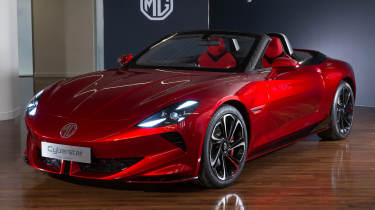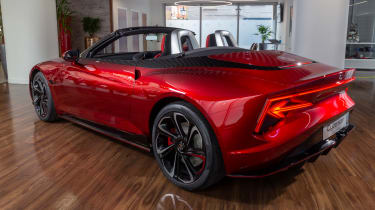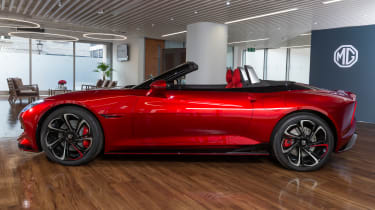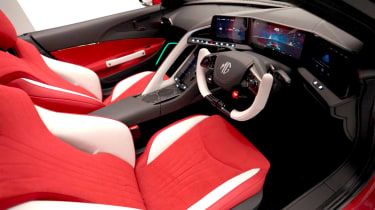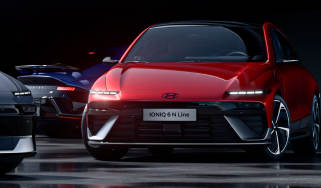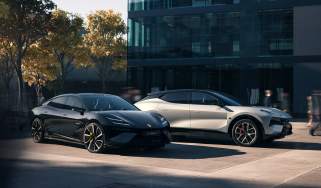New 2024 MG Cyberster: performance, design and interior
The Cyberster will arrive in the UK next summer with the electric Porsche 718 Boxster in its sights
Who saw that coming? Not the idea of a modern MG two-seater sports car; that thought’s been in every MG designer’s sketchpad ever since the TF ended production in the early 2010s (and in a fair few non-MG designer’s thoughts too). But the fact that modern-era MG, almost out of nowhere, has become a sales behemoth.
So far this year alone, MG Motor UK has registered nearly 26,000 cars, a 55 per cent growth on last year. Which was a 65 per cent growth on the year before. ‘This amount of growth is unsustainable,’ commercial director Guy Pigounakis tells evo. ‘Because if we continued at that rate we’d be the only people selling cars in the UK.’
As it is, MG is the 11th best selling brand in the country, outselling the likes of Peugeot, Land Rover, Mazda, Honda, and with the potential to overhaul 10th-placed Mercedes by year’s end. ‘It’s the fastest ever growth in the history of automotive Britain,’ Pigounakis says.
Those sales have been built on entirely worthy and competitively warrantied, but bland and forgettable crossovers, hatches and estate cars, however; far removed from the roadsters, performance saloon cars and hot hatches that have composed the majority of cars (good and bad) the MG badge has been attached to over its 100 years.
That’s about to change with the introduction of the MG Cyberster: an all-electric, two-seater roadster revealed as a concept car but confirmed for launch as a production car next year. ‘It’s very close to the final design,’ says advanced design director Carl Gotham. ‘It doesn’t reference one particular sports car; MG is a lot of sports cars, and we want it to shift into this new era of electrification.’
While final pricing is yet to be confirmed, and Pigounakis cautions that ‘we have to be careful with inflation’ as well as rising battery costs given that customer cars are 12 months away, nonetheless MG is planning for an entry price ‘around the £50,000-60,000 bracket.’ That will be for a single-motor, rear-wheel-drive model; there’ll be a dual-motor all-wheel-drive range-topper too, capable of 3.1 seconds to 60mph.
‘We started this project five years ago,’ Gotham says, moments after revealing the car at MG’s London design studio in Marylebone. ‘Although as an idea, it’s existed for many years previously; it’s something we’ve wanted to do from Day One, it’s never not been an idea.’
Wing doors add to the sense of theatre, whirring open electrically to reveal an interior which Gotham cautions is further from production reality but holds many clues as to the final car’s cockpit. While entry-level cars will have a conventional steering wheel, the show car’s yoke design is planned to be offered as an option, suggesting the Cyberster is likely to have a variable steering ratio for arms-crossed parking manoeuvres.
Likewise, the Cyberster name isn’t confirmed to be the production car’s final moniker, although nor is it ruled out.
The advanced design team moved to its two-storey Marylebone studio from Birmingham in 2018, to make the most of being immersed in London’s creative culture, and collaborate directly with MG’s studio in Shanghai – home of MG’s Chinese state-owned parent company, SAIC Motor.
The brief came in 2019 to think about a car for the 2021 Shanghai auto show. ‘We wanted an impactful design to show the brand’s future,’ Gotham explains, and the resultant aggressive design was well received by showgoers and SAIC top brass alike. Reputedly, MG chairman William Wang decided more or less on the spot to put the car into production.
The design has been softened for the production car: ‘An MG roadster should be universal in appeal,’ Gotham says. ‘It should be accessible for all people from a design point of view.’
With that in mind, the headlamps have been given an open shape, for a ‘friendly’ expression: ‘It’s an EV, which we don’t want to be viewed as a cold device.’ And while it’s powered by electric motors, the car’s been deliberately given classical, front-engined proportions. ‘It’s not about taking the windscreen to the front just because there’s no engine,’ Gotham says.
While it’s built upon a skateboard chassis, with the battery pack in the floor, the hip point is low on the show car and a black finisher below the roof helps disguise the body’s height.
It’s a long car – longer than one might expect of a traditional MG sports car.
‘People might have expected a Mazda MX-5 market competitor or an MG TF successor,’ Pigounakis explains, ‘but it’s a car that needs to feel more grown-up.’ And have space for the batteries; dimensions are broadly similar to a BMW Z4, but a bit longer and a bit wider. The Cyberster is more than 4.5m long, 1.9m wide and with a 2.7m wheelbase.
And the combustion-engined Z4, which starts from around £45k but sells fewer than 1000 cars a year in the UK, is in many ways is the Cyberster’s most direct market equivalent at presence. The new MG is more grown up – in size, price and ethos – than an MX-5, and pure electric sports car rivals just don’t exist yet.
Polestar’s electric roadster will cost six figures and is 2.5 years away; Porsche’s battery-powered Boxster successor has a similar timeframe, with pricing far from confirmed; Tesla’s new Roadster will cost more than £200,000, if it ever arrives.
Pigounakis freely admits that MG really doesn’t know how sales will pan out – but the company acknowledges that they may not be enormous.
‘We expect a big spike of initial buyers who’ve expressed interest, but beyond that we’ll have to wait and see.’
In the meantime, the electric MG4 hatchback – the sleeper hit that’s done much to bolster both MG’s sales and image – will soon be followed up by an X-Power (remember that badge?) performance version with 444bhp.
In fact, the MG4 will be the oldest car in the company’s line-up by the end of next year. ‘Every car we build from now will jump two generations,’ Pigounakis says. ‘For example, compare the Cyberster with GS from five years ago – it couldn’t be more different.’
And with the Ford Fiesta about to exit, the MG3’s hybrid successor, built on a new platform, could fill a good deal of the gap it leaves.
Shifting sands. Nobody might have bet on MG being first out of the blocks with a modern, mainstream electric sports car, and we still don’t know how it will drive. But on MG’s current form, we might be unwise to bet against it being a surprise success.
